Tech giant Apple has rejected the requests to exclude non-fungible tokens (NFTs) from the 30% “Apple Tax” on in-app purchases.
The company defined the policies for NFT-related apps running on the iOS on Monday when it has officially approved the offering of in-app NFT minting, buying and selling for the first time ever.
Although the activities above had technically never been banned, the company’s de facto ban on in-app NFT trading is likely to continue.
This is so that in-app NFT transactions are required to utilize Apple’s rails for in-app commerce, in which the manufacturer imposes a 30% royalty. In order to avoid losing a substantial portion of revenue, creators and marketplaces have actively resisted the taxes by restricting in-app NFT functionalities.
The Information published a report on how marketplaces and creators are steering clear of Apple’s ecosystem and sometimes abandon NFT integrations altogether because of the firm’s fee policies.
It would seem improbable that apps that decide to sell NFT mints could receive cryptocurrency as payment due to Apple’s “in-app purchase” service lacking support for cryptocurrency payments.
This is the first instance where Apple has set out clearly defined rules for NFTs in its App Store guidelines.
The updated policy prohibits apps from giving NFT owners special access or referring their users to third-party platforms where they could buy, sell, or mint outside the Apple ecosystem, circumventing the cost scornfully referred to as the “Apple Tax”.
The revised phrasing in the App Store guidelines does not substantially alter Apple’s existing regulations allowing in-app cryptocurrency trading on platforms like Coinbase and FTX, which are exempt from 30% transaction fees.



